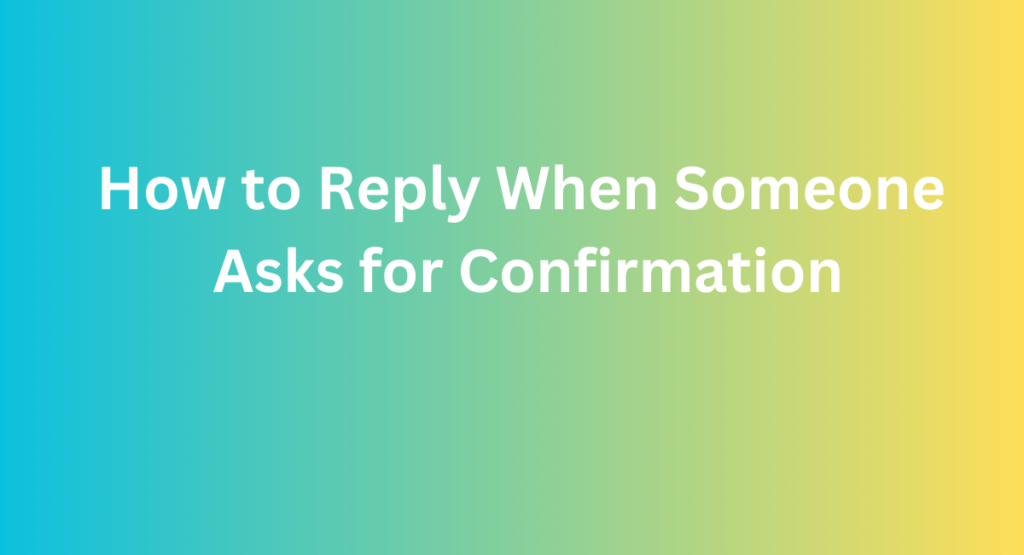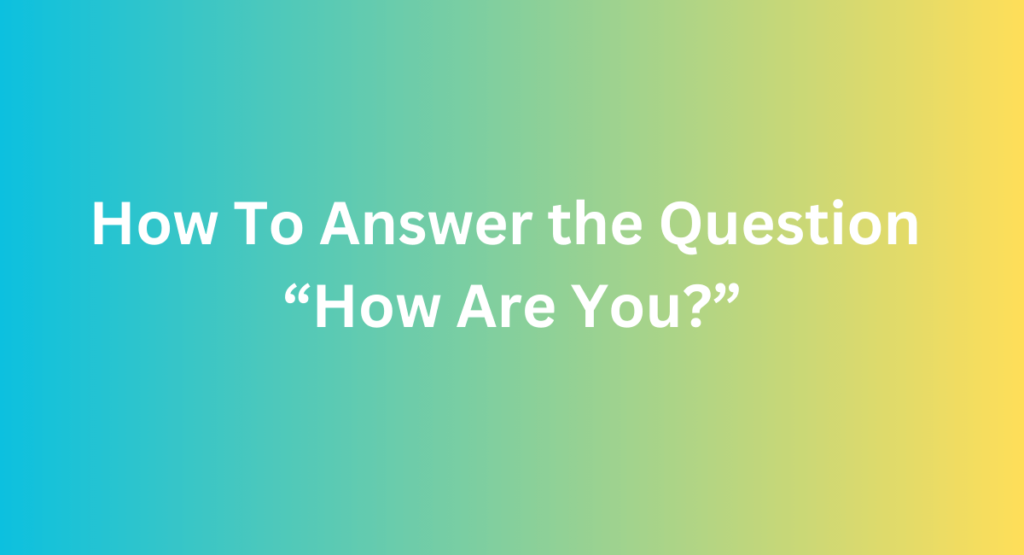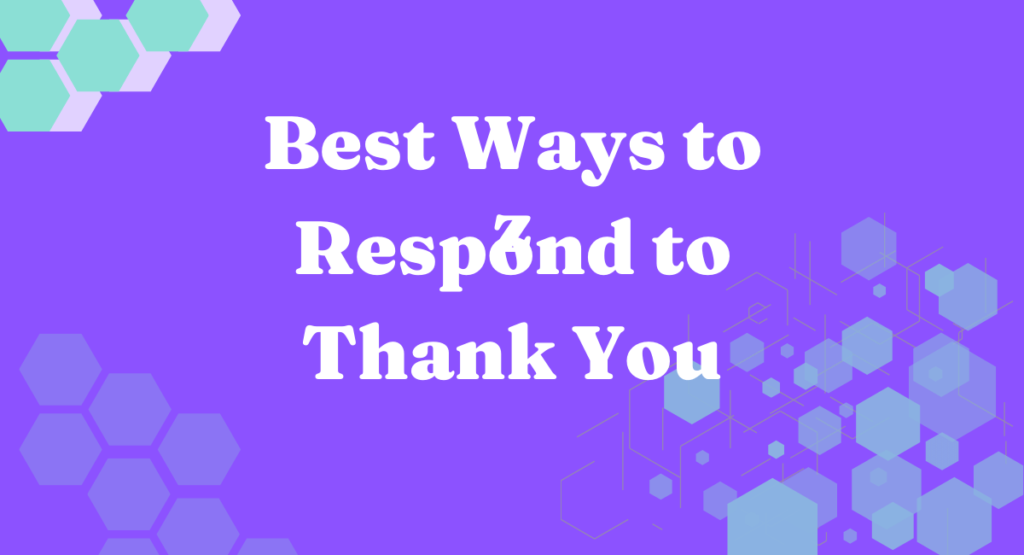When someone asks for confirmation, reply clearly and promptly. Acknowledge the request and confirm the details immediately.
When someone asks for confirmation, it’s important to reply promptly and clearly. Whether it’s confirming an appointment, a meeting, or any other request, your response sets the tone for future interactions. A timely and affirmative confirmation not only reassures the requester but also reflects professionalism.
In this guide, we’ll explore effective ways to reply when someone asks for confirmation and provide tips to ensure your response is clear and concise. By following these strategies, you can enhance communication, build trust, and maintain positive professional relationships.
Understanding Confirmation Requests
When someone asks for confirmation, it’s important to restate the information, declare what you will do with it, and ask for further confirmation if necessary. This ensures effective communication and clarity in your response.
Understanding Confirmation Requests Confirmation requests are a common form of communication in both personal and professional settings. When someone asks for confirmation, they are seeking assurance that a particular piece of information or request has been received and understood. Responding to confirmation requests effectively is essential in maintaining clear and effective communication. In this blog post, we will explore what confirmation requests are, and common scenarios where they occur, and provide tips on how to respond to them.
30 Best Reply When Someone Asks for Confirmation
1. “Absolutely, you can count on me.”
2. “Confirmed! I’ll be there as planned.”
3. “Yes, I’m on board. Consider it confirmed.”
4. “Affirmative! I’ve got it covered.”
5. “You can consider it confirmed. I’m in.”
6. “Confirmed! I’ll make sure everything is sorted.”
7. “Certainly! You have my confirmation.”
8. “Yes, I confirm my commitment to this.”
9. “Absolutely, no doubts here. It’s confirmed.”
10. “Consider it confirmed. I’ll take care of it.”
11. “Affirmed! I’ll get started right away.”
12. “Confirmed and acknowledged. I’m on it.”
13. “Yes, I confirm my attendance/participation.”
14. “Certainly! It’s confirmed from my end.”
15. “You’ve got my confirmation. I agree.”
16. “Affirmative! I’m confirming my commitment.”
17. “Confirmed! I’ll proceed accordingly.”
18. “Yes, I confirm that I’ll follow through.”
19. “Absolutely, consider it confirmed and sorted.”
20. “Affirmed. I’ll ensure everything is in order.”
21. “Yes, confirmed. I’ll be there as discussed.”
22. “You can count on my confirmation for this.”
23. “Confirmed! I’m fully on board with the plan.”
24. “Absolutely, consider it confirmed on my end.”
25. “Yes, I confirm my availability/participation.”
26. “Affirmative! You have my confirmation.”
27. “Confirmed. I’ll proceed as per our agreement.”
28. “Certainly! I confirm my commitment to this.”
29. “Yes, consider it confirmed. I’ll take care of it.”
30. “Affirmed! I’ll make sure everything goes smoothly.”
Casual Response When Someone Asks for Confirmation
Here are 10 casual responses when someone asks for confirmation:
– Yep, that’s correct.
– That’s right, you got it.
– Absolutely, spot on.
– Exactly, couldn’t have said it better.
– Yep, you’re right on the money.
– Spot on, nailed it.
– Right on the nose, good job.
– Bingo, you got it.
– Yup, that’s the one.
– Righto, you’re on track.
These responses are informal and can be used in casual conversations with friends or acquaintances.
Friendly Response When Someone Asks for Confirmation
Here are 10 friendly responses when someone asks for confirmation:
– Absolutely, you’re right!
– Yes, indeed, you’re spot on!
– Absolutely, couldn’t agree more!
– Definitely, that’s exactly it!
– For sure, you’ve got it!
– Absolutely, that’s precisely correct!
– Yes, indeed, you’ve hit the nail on the head!
– Exactly, you’re correct!
– Absolutely, you’re absolutely on point!
– Definitely, you’re right on target!
These responses convey warmth and agreement while confirming the correctness of the other person’s statement.
What Are Confirmation Requests?
Confirmation requests are messages or inquiries that seek acknowledgment or verification of a previous piece of information. These requests can be in various forms, such as emails, text messages, or face-to-face interactions. The purpose of a confirmation request is to ensure that both parties are on the same page and have a clear understanding of the information or request at hand.
Common Scenarios
Confirmation requests can arise in different situations, and being able to respond appropriately is crucial. Let’s explore some common scenarios where confirmation requests commonly occur:
1. Appointment Confirmations: – When scheduling appointments, it is essential to confirm the date, time, and location to avoid any misunderstandings. – Example response: “Thank you for scheduling our meeting on [date] at [time]. I confirm my availability and look forward to discussing [topic] at [location].”
2. Order Confirmations: – In e-commerce or retail scenarios, customers may request confirmation of their orders to ensure accurate processing and delivery. – Example response: “Thank you for your order. We have received it and will process it promptly. You can expect delivery within [estimated timeframe].”
3. RSVP Confirmations: – When invited to events or gatherings, it is customary to confirm attendance or convey regrets. – Example response: “Thank you for inviting me to [event]. I am pleased to confirm my attendance and look forward to joining you on [date].”
Effective Response Tips
When replying to a confirmation request, it is important to keep these tips in mind to enhance the effectiveness of your response:
1. Restate The Information That Was Confirmed: – This reassures the person requesting confirmation that the intended information has been received and understood. – Example response: “I want to confirm that I have received the [specific information] you provided.”
2. Declare What You Will Do With The Confirmed Information: – Communicate how you will proceed or use the confirmed information, providing further clarity. – Example response: “With the confirmed [information], I will [action].”
3. Ask For Further Confirmation If Needed: – If there are any uncertainties or additional details required, it is appropriate to seek further clarification. – Example response: “If there are any further details or clarifications needed, please do not hesitate to let me know.” By understanding confirmation requests and following these tips, you can respond effectively and maintain clear and concise communication. Remember, acknowledging and confirming information not only demonstrates professionalism but also fosters trust and strengthens relationships.
Importance Of Responding To Confirmation Requests
When someone asks for confirmation, it is important to respond promptly and clearly. Restate the confirmed information, declare your next steps, and ask for additional confirmation if necessary. By doing so, you can ensure effective communication and avoid any misunderstandings.
The importance of responding to confirmation requests cannot be overstated. When someone asks for confirmation, it’s crucial to provide a prompt and clear response. This not only establishes clear communication but also helps in building trust and reliability.
Establishing Clear Communication
Responding to confirmation requests is vital for establishing clear communication. By acknowledging and confirming the details, you ensure that all parties involved are on the same page. This helps in avoiding misunderstandings and ensures that everyone has a clear understanding of the situation.
Building Trust And Reliability
When you reply to confirmation requests, you are demonstrating your reliability and trustworthiness. By promptly confirming the details, you show that you are responsible and take the communication seriously. This, in turn, fosters trust and strengthens the relationship between the parties involved. In conclusion, responding to confirmation requests is not just a formality, but a crucial aspect of effective communication. It ensures that everyone is on the same page and helps in building trust and reliability in professional relationships.
Effective Strategies For Responding
When someone requests confirmation, it’s important to respond clearly and effectively. Utilizing the following strategies can help ensure your reply is both professional and informative.
Acknowledge The Request
Upon receiving a confirmation request, acknowledge it promptly. This shows respect and professionalism. Confirm receipt of the request and express appreciation for the opportunity to provide the required confirmation.
Provide A Clear Answer
When responding, provide a clear and concise answer to the request. Avoid ambiguity by stating a definite confirmation or denial. This eliminates any potential misunderstanding and demonstrates your reliability.
Offer Additional Information Or Assistance
If necessary, offer additional information or assistance to complement the confirmation. Providing details or resources that may be helpful to the requester can enhance the overall communication and further demonstrate your cooperation.
Best Practices For Polite And Professional Responses
When someone asks for confirmation, it’s best to be polite and professional in your reply. Restate the information that was confirmed, declare what you will do with the confirmed information, and ask for further confirmation if needed. Keeping your response clear, concise, and immediate will increase its effectiveness.
When someone asks for confirmation, it’s important to respond politely and professionally. Your response reflects your professionalism and can leave a lasting impression. Here are some best practices to keep in mind:
Use A Friendly Tone
When replying to a confirmation request, it’s crucial to use a friendly tone in your response. This helps to establish positive and amicable communication. Use words like “Thank you”, “I appreciate”, or “I’m glad” to convey your gratitude and friendliness. By using a friendly tone, you can build rapport and make the other person feel valued.
Be Prompt With Your Reply
Timeliness is key when responding to a confirmation request. Promptness shows respect for the sender’s time and urgency. Aim to reply as soon as possible, preferably within 24 hours. If you need more time to confirm or gather additional information, acknowledge the request and provide an estimated response time. Being prompt in your reply reinforces your professionalism and reliability.
Express Gratitude
Expressing gratitude is an important aspect of a polite and professional response. Take a moment to thank the person for their request or for considering you for something. Showing gratitude not only demonstrates your appreciation but also creates a positive impression. Remember, a simple “Thank you” can go a long way in establishing a good rapport and maintaining a professional relationship.
Overall, by following these best practices, you can ensure that your response to a confirmation request is both polite and professional. Using a friendly tone, being prompt with your reply, and expressing gratitude will help foster positive communication and leave a lasting impression.
Common Mistakes To Avoid
When someone asks for confirmation, it is important to respond in a clear and timely manner. However, there are common mistakes that people often make when replying to confirmation requests. By avoiding these mistakes, you can ensure effective communication and maintain a good professional image.
Avoiding Ambiguous Replies
One common mistake to avoid is giving ambiguous replies. It is crucial to provide a clear and concise response that leaves no room for confusion. Ambiguous replies can lead to misunderstandings and delays in the confirmation process. To avoid this, ensure that your reply is straightforward and addresses all the necessary information.
For example, instead of saying “I’ll try to make it,” which leaves room for uncertainty, be direct and say “I will be attending the meeting.” This eliminates any confusion and provides a definite confirmation.
Not Ignoring Or Delaying Responses
Another mistake to avoid is ignoring or delaying responses. Promptness is key when replying to confirmation requests. Ignoring or delaying responses can be seen as unprofessional and may cause frustration for the person awaiting confirmation.
Make it a priority to respond to confirmation requests as soon as possible. Even if you can’t confirm immediately, acknowledging the request and providing an estimated timeframe for a definitive response is better than complete silence. This demonstrates your professionalism and respect for the other person’s time.
For instance, you can reply saying, “Thank you for the invitation. I will check my schedule and get back to you with a confirmation by the end of the day.” This shows that you value their invitation and will provide a timely response.
By avoiding these common mistakes and providing clear and timely responses, you can effectively reply when someone asks for confirmation. Remember, the key is to be concise and prompt, ensuring a smooth and efficient communication process.
Frequently Asked Questions Of How To Reply When Someone Ask For Confirmation
How Do You Respond To A Confirmation Request?
When responding to a confirmation request, restate the information, declare your action, and ask for further confirmation if necessary. Thank the sender and confirm immediately with clear and concise language. You can also confirm the receipt and state your response shortly.
How Do You Respond To Confirmation Availability?
When responding to a confirmation availability request, be clear and concise. Restate the confirmed information, declare what you will do with it, and ask for further confirmation if needed.
How Do You Politely Confirm?
To politely confirm, restate the information that was confirmed, declare what you will do with the confirmed information, and ask for further confirmation if needed.
How Do You Respond To Please Confirm Your Appointment?
Sure, I appreciate the invitation for the appointment. I confirm our meeting on [date] at [time] to discuss [topic]. The location is scheduled at [location]. If there are any changes or adjustments, please contact me at [phone number].
Conclusion
To ensure effective communication when someone asks for confirmation, there are a few important guidelines to follow. Firstly, it’s essential to restate the information that has been confirmed to avoid any confusion. Secondly, clearly state what actions will be taken with the confirmed information.
Lastly, if needed, politely ask for further confirmation to ensure accuracy. By adhering to these guidelines, you can provide a clear and concise response to confirmation requests.





